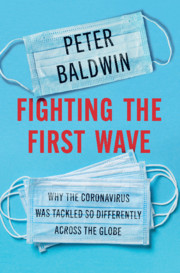Book contents
- Fighting the First Wave
- Also by Peter Baldwin
- Fighting the First Wave
- Copyright page
- Dedication
- Contents
- Introduction: One Threat, Many Responses
- Chapter 1 Science, Politics, and History
- Chapter 2 New Dogs, Old Tricks
- Chapter 3 The Politics of Prevention
- Chapter 4 What Was Done?
- Chapter 5 Why the Preventive Playing Field Was Not Level
- Chapter 6 Where and Why Science Mattered
- Chapter 7 From State to Citizen
- Chapter 8 Who Is Responsible for Our Health?
- Chapter 9 Difficult Decisions in Hard Times
- Conclusion: Public Health and Public Goods
- Acknowledgments
- Notes
- Index
Chapter 9 - Difficult Decisions in Hard Times
Trade-offs between Being Safe and Being Solvent
Published online by Cambridge University Press: 12 March 2021
- Fighting the First Wave
- Also by Peter Baldwin
- Fighting the First Wave
- Copyright page
- Dedication
- Contents
- Introduction: One Threat, Many Responses
- Chapter 1 Science, Politics, and History
- Chapter 2 New Dogs, Old Tricks
- Chapter 3 The Politics of Prevention
- Chapter 4 What Was Done?
- Chapter 5 Why the Preventive Playing Field Was Not Level
- Chapter 6 Where and Why Science Mattered
- Chapter 7 From State to Citizen
- Chapter 8 Who Is Responsible for Our Health?
- Chapter 9 Difficult Decisions in Hard Times
- Conclusion: Public Health and Public Goods
- Acknowledgments
- Notes
- Index
Summary
The pandemic forced trade-offs between various goods. Shutting down mobility and the economy meant that diseases other than Covid-19 would not be treated. That raised mortality from other causes, even as it may have saved lives from the coronavirus. Locking down the economy imposed hardships that also had severe consequences, unemployment, bankruptcy, even hunger and starvation in some countries. The psychological effects were drastic, too, especially among the elderly who were now often isolated, and the young, whose lives were put on hold. The pandemic laid bare social conflicts – between those who could escape crowded cities and those who had to remain, between frontline and necessary workers and those who could work at home, between the vulnerable old and the less exposed young. Faced with mounting illnesses, physicians had to limit scarce resources and triage patients. Among the biggest decisions was the cost of lockdowns. Putting entire economies on hold was so expensive that some questioned its social utility, even compared with the deaths an unchecked pandemic would bring. The effects of increased poverty in the underdeveloped world were harrowing.
- Type
- Chapter
- Information
- Fighting the First WaveWhy the Coronavirus Was Tackled So Differently Across the Globe, pp. 223 - 258Publisher: Cambridge University PressPrint publication year: 2021

